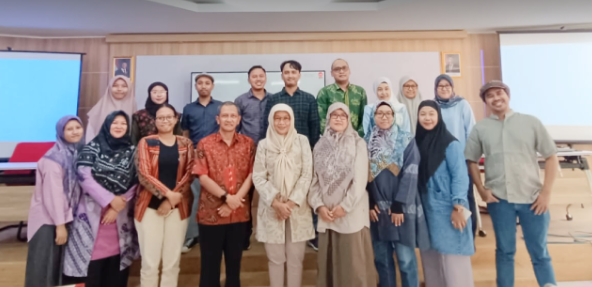
Yogyakarta, 12/06/2025 – The Department of Anthropology held a dissertation proposal seminar on June 12, 2025, featuring Tri Isnani’s research titled “The Existence of the Brandu Tradition Amid the Anthrax Outbreak in the Special Region of Yogyakarta (DIY).”
The brandu tradition is a community-based fundraising practice in which local residents collectively contribute money to ease the financial burden of livestock owners whose animals are either sick or have died. Livestock holds deep cultural and economic significance for the community. The term brandu originates from minterke anak—meaning “to support a child”—highlighting the role of animals such as cows and goats as a form of savings, often used to finance children’s education, weddings, and traditional ceremonies such as rasulan, ingkung sewu, nyumbang, and others.
However, Isnani noted growing public concern over the anthrax outbreak, which has become a serious public health crisis in the region. The issue has drawn the attention of not only the public but also government bodies and health agencies. In response, Isnani proposed a deeper investigation through the lens of medical anthropology.
Prof. Dr. Atik Triratnawati, M.A., as Isnani’s main supervisor, and Dr. M. Choirul Hidajat, SKM., M.Kes., both emphasized the need for anthropological research grounded in an emic perspective, employing ethnographic methods in the formulation of health-related programs and policies. They stressed that such an approach is crucial for effective disease control under the “One Health” framework—a multidisciplinary strategy encompassing both prevention and treatment.
The seminar also featured Dr. Elan A. Lazuardi, a faculty member in the Department of Anthropology with a focus on health studies. He underlined the importance of researcher positionality in fieldwork. Additional discussants—Ahriyadi Sofyan, Rizqi R., Ayu F., and Dyah Ayu—offered constructive feedback to help strengthen Isnani’s research. The event was also attended by students from the Master’s and Doctoral programs in Anthropology, as well as from the Doctoral Program in Humanities.
In closing, Prof. Dr. Atik Triratnawati reminded participants that doctoral research should arrive at a philosophical understanding rooted in community values—specifically, exploring the deeper meaning behind the brandu tradition. Once such a philosophy is grasped, it can shape the direction of the research more profoundly.
Furthermore, Dr. M. Choirul Hidajat, a researcher at BRIN (National Research and Innovation Agency), highlighted the relevance of anthropological perspectives in medical studies. He emphasized that the novelty of such research lies in anthropology’s ability to interpret health phenomena in culturally grounded ways. “This is crucial,” he said. “Perhaps the true contribution of this study is its potential to offer input into health programs that empower, rather than intimidate, the community—ultimately supporting inclusive program development.”
[Cultural Anthropology, Dewi Widyastuti]

